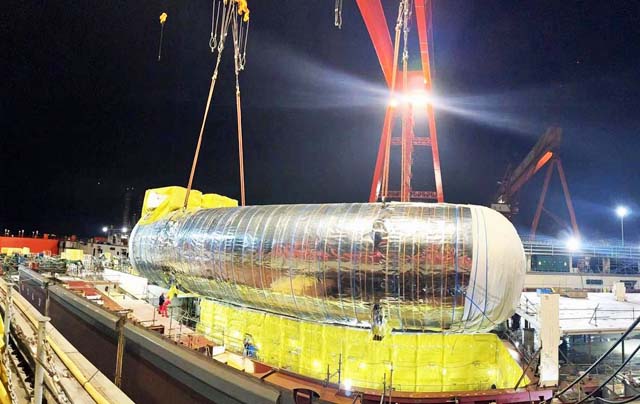The first DNV-approved LNG/ammonia tank has been lifted onboard and installed on Höegh Autoliners´ first Aurora Class newbuild making the vessel a genuine sustainability first mover within the PCTC segment.
Tasks were carried out under the supervision of TGE Marine engineers and shipyard specialists. Reports from the shipyard in China indicate that everything proceeded smoothly and according to plan. The installation of the ships´ most expensive single component represents another concrete step on Höegh Autoliners´ path to decarbonisation of customer supply chains and will accelerate a push towards net zero shipping.
The Aurora Class is said to be the largest and most environmentally friendly car carrier to be built. All of the Aurora Class vessels will have the tank system from TGE onboard. With the installation of the 3,400 m3 capacity stainless steel tank measuring 40.5m x 13.4m x 8.0m the company says it is edging closer to fulfilling its ambitious emission cuts target. Höegh Autoliners´ Aurora Class, the first two vessels expected to be delivered in 2024, will be the first in the PCTC segment to receive DNV’s ammonia and methanol-ready notations.
Liquefied gas systems provider TGE Marine is experienced in working with these tanks. Thanks to this expertise the tanks are ready to store ammonia. With an easy coating, the tanks will be able to store methanol making the LNG/ammonia/methanol combination unique in the industry.
COO Höegh Autoliners, Sebjørn Dahl said: “At Höegh Autoliners we have a strong commitment to continue to discover environmentally sustainable solutions. We consider clean ammonia a future maritime fuel with high potential that will contribute to solving the greenhouse gas emission challenges associated with global maritime transportation.”
Höegh Autoliners recently partnered with Yara Clean Ammonia for a future supply deal for clean ammonia. Being a member of the First Movers Coalition, a World Economic Forum-backed initiative focused on reducing emissions in the ‘hard-to-abate’ sectors, Höegh Autoliners has committed to powering at least 5% of its deep-sea operations with green ammonia by 2030. The goal is to run its fleet on at least 100,000t of green ammonia by that same year.
Ammonia has about half the energy density of bunker fuels and takes on a liquid form at -33C, meaning it does not require to be stored in high-pressure or cryogenic tanks. According to Global Maritime Forum´s briefing paper on ammonia, the synthesis of ammonia from zero carbon hydrogen using the Haber-Bosch process is efficient and fully scaled. Because the Haber-Bosch process requires less energy than the synthesis of methanol or e-methane, ammonia is expected to be cheaper than either of these other sustainable fuels.
Höegh Autoliners has an ongoing initiative to train seafarers in the operation of ammonia-fuelled vessels. Establishing a stable cohort of seafarers ensures their familiarity with the fleet, while enabling them to transfer their knowledge and extensive expertise seamlessly to the upcoming Aurora Class vessels.



